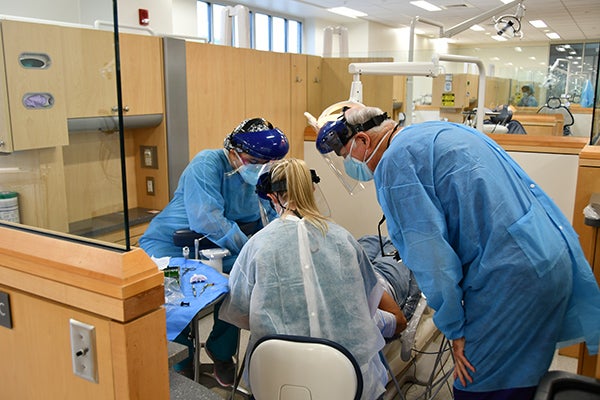ECU School of Dental Medicine receives $3.2 million to fund scholarships for disadvantaged students

School of Dental Medicine students work alongside a faculty member to provide oral health care to a patient in Ross Hall. (Photo by Jon Jones)
The ECU School of Dental Medicine has received a $3.2 million grant to continue its Scholarships for Disadvantaged Students (SDS) program, funding scholarships for economically disadvantaged students over the next five years.
The grant from the Health Resources and Services Administration (HRSA) in the U.S. Department of Health and Human Services is a renewal of a similar award in 2016. The grant continuation provides opportunities for the school to increase the recruitment, retention and graduation of students from disadvantaged backgrounds, including under-represented minority students, who will eventually practice as primary care dentists in underserved areas of North Carolina.
“The scholarship program is exactly in alignment with our school’s mission,” said Dr. Margaret Wilson, vice dean of the School of Dental Medicine. “HRSA has been wonderful in their support of us.”
The number of scholarships awarded through the grant will vary depending on the number of eligible students who apply, said Dr. Wanda Wright, project director, assistant professor and division director of dental public health at the School of Dental Medicine.
“Students will be awarded each year, and each student will receive between $20,000-40,000 per year,” she said.
Students must apply for the scholarship each year, so some might receive the scholarship all four years while others might receive it for one, two or three years.
For some students with talent, potential and the desire to serve, cost is the biggest barrier to an education in the health sciences, Wright said.
Since then, 32 students per year in the Doctor of Dental Medicine degree program were supported by SDS scholarships. To date, 24 SDS recipients have graduated from the school, and 18 of them practice as primary care dentists in North Carolina. The other six SDS graduates are all pursuing advanced training in primary care. Of the 18 SDS graduates practicing as a general dentist, 10 practice in a medically underserved community.
During the academic years 2016–2019, 26% of full-time enrolled ECU School of Dental Medicine students were underrepresented minority students, 24% of graduates practiced in medically underserved communities and 92 of the graduates practiced as primary care dentists.
The School of Dental Medicine uses HRSA guidelines to identify students who meet eligibility criteria for Scholarships for Disadvantaged Students. Priority will be given to students with severe financial need.
Once students are accepted into the dental school, they can apply for the scholarship funding, show that they meet HRSA’s strict program requirements and outline their intent to eventually practice as primary care dentists in one of the state’s areas of need.
Part of the win-win format of the grant, Wright said, is that many of the students who benefit from the scholarships come from rural areas. They, in turn, are familiar with the challenges these areas of the state face and are likely to practice in similar communities.
“Our curriculum has a heavy emphasis on how to care for patients in rural areas,” she said. “This grant is really helping us fulfill the mission of the school.”
The ECU School of Dental Medicine also recently received a $3.1 million HRSA grant, directed by Dr. Michael Webb and Dr. Mark Moss, to provide intensive instruction to residents on how to care for patients with special needs.
###
East Carolina University, or ECU as it’s best known, offers more than 85 bachelor’s, 72 master’s and 19 doctoral degrees to nearly 29,000 students on its Greenville, North Carolina, campus and through an acclaimed online learning program. The university’s school of medicine is recognized nationally for producing primary care physicians, cardiovascular research, advanced robotic surgery as well as obesity and diabetes breakthroughs. ECU also boasts the largest business school enrollment and largest number of new nurses and education professionals produced by a four-year North Carolina university, in addition to the largest studio art program in the state.
Located near Atlantic coast harbors where pirates once roamed, ECU adopted the “Pirates” mascot in 1934 for its NCAA Division 1 athletics program. The university has a globally recognized academic underwater archaeology program and enjoys a supportive relationship with the U.S. military services.
The ECU School of Dental Medicine is dedicated to addressing North Carolina’s ongoing shortage and maldistribution of dentists. The school educates primary care dentists who want to meet the challenges of providing care in rural and underserved areas of the state. Programs include the pre-doctoral program leading to a doctor of dental medicine degree (DMD), two post-doctoral residency programs in general dentistry, and a pediatric dentistry residency program. A key component of the DMD program is the fourth-year experience at community service learning centers in rural communities across the state. The school leverages the latest educational and patient-care technologies to maximize student learning and patient care. Learn more about the ECU School of Dental Medicine at www.ecu.edu\dental.
Based in Charlotte, North Carolina, and established in 1924 by industrialist and philanthropist James B. Duke, The Duke Endowment is a private foundation that strengthens communities in North Carolina and South Carolina by nurturing children, promoting health, educating minds and enriching spirits. Since its founding, it has distributed more than $3.7 billion in grants. The Endowment shares a name with Duke University and Duke Energy, but all are separate organizations. For more information, go to https://dukeendowment.org/
ECU News Services
Howard House, 1001 E. Fifth Street
Greenville, NC 27858
ecunews@ecu.edu
Phone: 252-328-6481
news.ecu.edu
Contact: Spaine Stephens, Health Sciences Communications, stephenss@ecu.edu
Telephone: 252-744-3808